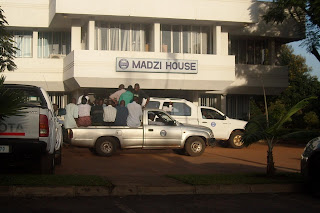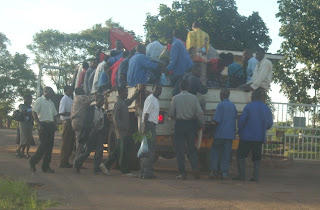One of major problem is the absence of street grid which precludes land and home ownership and the provision of services (such as electricity, water, sewerage, waste collection, etc...). This makes sense: how can you provide services who people without a legal claim to their land - you'd be acting without a mandate, and essentially validating their illegal occupation of the public or private land on which the slum has sprung. "Sprung" is the wrong word here, as some of these places have been in place for decades...
In Malawi, this rigid vision of things seems to, thankfully in many ways, be a foreign concept. The low income areas that I visited have low density, and they benefit from some services: electricy and water kiosks, such as the one below.
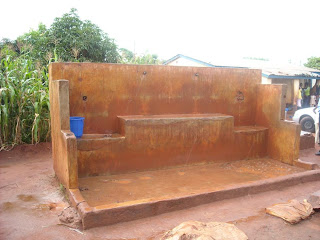 One of the most pleasant surprises this particular LIA (low income area) was the absence of waste in the streets, the teeming economic activity, and the omnipresence of agricultural land uses.
One of the most pleasant surprises this particular LIA (low income area) was the absence of waste in the streets, the teeming economic activity, and the omnipresence of agricultural land uses.Woman doing laundry with water from the kiosk. Water is purchased at 2.5 Kwacha for 20liters (or about 125 Kw, 0.8USD per cubic meter), which is significantly more expensive than pipe water delivered to the home (about 54 Kwacha, or 1/3 of a USD per cubic meter). On the other hand, slum dwellers control their water use both because they have to get it by hand (exhausting) and because they have limited cash on a daily basis. They would not be able to afford paying the monthly bill because they could never retain the cash long enough to pay the bill in full at once. In a perverse way, they are better off without a permanent home connection...
 Children always love it when azungu (white men in Chichewa) show up.
Children always love it when azungu (white men in Chichewa) show up.
 It's the rainy season, and this girl is wise to carry protection...
It's the rainy season, and this girl is wise to carry protection...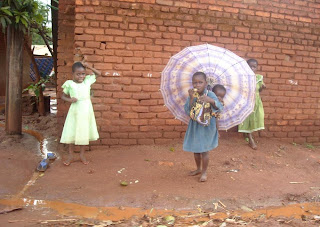
A bar in front of a corn field.
 A coffin shop with some lumber in front of it.
A coffin shop with some lumber in front of it.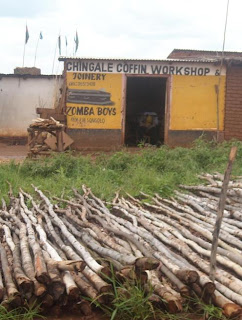 A woman loading a child on her back in front of some bicycles used for public transport. The open space in the back is not part of the low-income area, obviously.
A woman loading a child on her back in front of some bicycles used for public transport. The open space in the back is not part of the low-income area, obviously.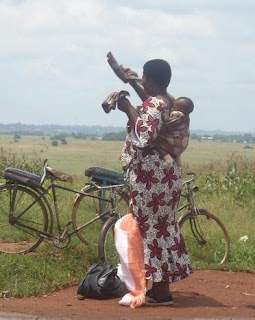 A few stores in the LIA. This one sells goods and telephone calls and scratch cards.
A few stores in the LIA. This one sells goods and telephone calls and scratch cards. This one sells sundry goods. Note the pumpkin patch immediately behind it and the space between buildings. If you've ever been to a Brasilian favela or to a slum in Nairobi, you'll know why this is unusual.
This one sells sundry goods. Note the pumpkin patch immediately behind it and the space between buildings. If you've ever been to a Brasilian favela or to a slum in Nairobi, you'll know why this is unusual.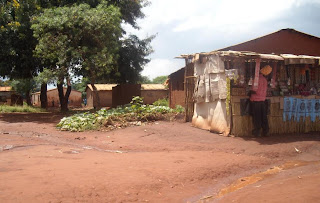 There are also workshops in the LIA. This one repairs TV sets and electronics.
There are also workshops in the LIA. This one repairs TV sets and electronics.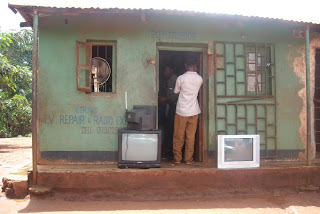 This one fixes bicycles, which is a major mode of transport despite the rains. Again, note the open space and absence of garbage.
This one fixes bicycles, which is a major mode of transport despite the rains. Again, note the open space and absence of garbage.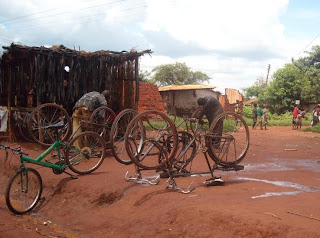 A corn field and some pumpkins for sale, smack in the middle of the LIA. No garbage.
A corn field and some pumpkins for sale, smack in the middle of the LIA. No garbage.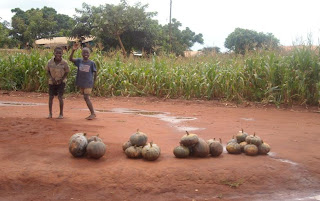 An example of some houses.
An example of some houses.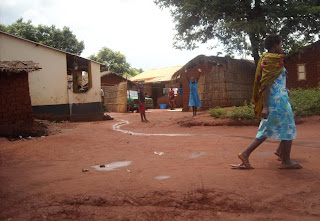 Another house with a cornfield next to it.
Another house with a cornfield next to it. All in all, this is not so different from the non-urban villages that I have seen, and radically different from all other slums that I've ever been to. That said, I am told that there are other, more crowded, slums in Blantyre and in other places in Lilongwe.
All in all, this is not so different from the non-urban villages that I have seen, and radically different from all other slums that I've ever been to. That said, I am told that there are other, more crowded, slums in Blantyre and in other places in Lilongwe.God is everywhere...
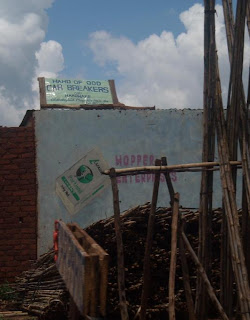
A tyre recycling "plant", next to the hand of God car wrecking service.
 Elsewhere in town, somebody is worried about a shortage of nurses.
Elsewhere in town, somebody is worried about a shortage of nurses.
